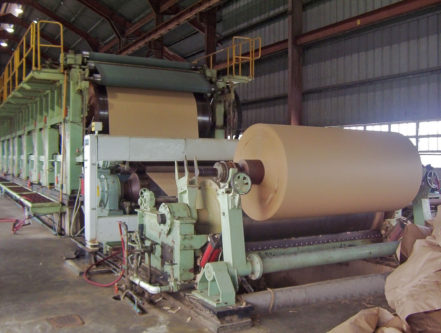The local paper and paper container manufacturing company Caribbean Container Inc (CCI) has announced that with effect from the end of June it will be suspending the operations of its Paper Recycling Plant and reverting immediately to imported paper as the primary raw material for its box manufacturing facility.
Chief Executive Officer of CCI Patricia Bacchus told Stabroek Business in an exclusive interview on Wednesday that, initially, the plant, which was installed in 2002, will be closed for 36 months after which the outcome of a re-evaluation of the operations will determine the way forward.
“During that period or at the end thereof a further decision will be taken based on the objective circumstances,” Bacchus told Stabroek Business. She said it was a Board decision.

Prior to the commissioning of the Paper Recycling Plant in 2002, CCI had relied entirely on imported paper in the production of corrugated packaging by its Box Manufacturing Facility, which has been operational since 1983. Bacchus told Stabroek Business that the issue of the viability of the recycling operation had been under consideration since 2015 based on what she said were “design limitations and quality performance, regional and extra regional competition” and “issues affecting cost of production.”
With regard to “design limitations and quality performance” Bacchus said the recycling plant is more than 25 years old and that while it was intended to manufacture medium and heavyweight recycled paperboard international industry trends have moved in the direction of using lightweight, high performance paperboard (Kraft and semi-chemical medium), which allow for greater functionality and overall quality elevation of corrugated packaging. Consequently, the company has been compelled, frequently, to import Kraft paperboard in order to meet particular customer requirements.
Bacchus said that last year CCI engaged an international paper-making expert to undertake a technical assessment of the plant and to make recommendations for re-tooling. Arising out of that exercise 40 action items were identified for phase one of a retooling exercise. She said however, that cost considerations amounting to “several millions of US dollars” had led to the conclusion that the time was not opportune to incur a debt of that magnitude “in the light of the fact that the company had, only 10 years earlier, averted foreclosure on account of its heavy debt burden and has been debt free for only a few years She said the decision to set aside the re-tooling exercise was also informed by the fact that the recycling plant operates at a low 25% capacity due to raw material constraints and a lack of market opportunity for surplus recycled paper in the region.
Bacchus said that regional and extra-regional competition, particularly over the past three years from other entities offering a high-quality product “at very attractive prices,” has also affected the viability of the plant’s operations. “Although we have been able to preserve our supply relationship with most of our customers based on a history of good customer service, we recognize that we need to offer a product that is comparable if we are to retain our current base of regional customers and penetrate new markets,” Bacchus said, adding that this cannot be accomplished utilizing recycled paper manufactured by the recycling plant.
And according to Bacchus, one issue that has always affected the performance of the plant is the limited supply of waste cardboard available locally. “About one third of the raw material requirement is supplied locally. The remainder is imported from Trinidad and Tobago and Suriname. When the cost of freight is added the average price of the cardboard waste, the main raw material for recycling, is quite high,” she added, detailing what she described as “several less than successful initiatives undertaken locally to increase waste cardboard supplies.”
Bacchus said that setting aside the local scarcity of raw material, operating costs had been significantly affected by the fact that recycling operations are energy intensive and therefore costly in terms of electricity. “In contrast to Guyana, most international paper recycling plants are run on cheaper sources of energy, particularly hydropower,” she added.
Meanwhile, Bacchus said that as a consequence of the decision taken by the company 30 employees will be severed and will receive the requisite benefits as stipulated under the law. “Both the Ministry of Social Protection and the relevant trade union have been involved in discourses with the company,” she added. The company CEO said that some of the affected staff are likely to be rehired to serves in other facets of its operations.
“The decision was a difficult one to take. In the final analysis, however, the Board was guided by the overall interests of the company, and with a view to ensuring growth in regional market share and continued returns to shareholders,” Bacchus said.




